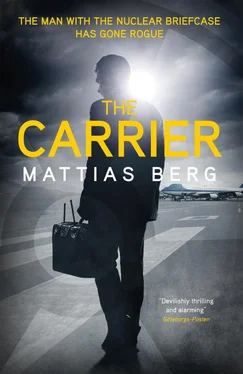Mattias Berg - The Carrier
Здесь есть возможность читать онлайн «Mattias Berg - The Carrier» весь текст электронной книги совершенно бесплатно (целиком полную версию без сокращений). В некоторых случаях можно слушать аудио, скачать через торрент в формате fb2 и присутствует краткое содержание. Город: London, Год выпуска: 2019, ISBN: 2019, Издательство: MacLehose Press, Жанр: Триллер, на английском языке. Описание произведения, (предисловие) а так же отзывы посетителей доступны на портале библиотеки ЛибКат.
- Название:The Carrier
- Автор:
- Издательство:MacLehose Press
- Жанр:
- Год:2019
- Город:London
- ISBN:978-0-85705-788-4
- Рейтинг книги:4 / 5. Голосов: 1
-
Избранное:Добавить в избранное
- Отзывы:
-
Ваша оценка:
- 80
- 1
- 2
- 3
- 4
- 5
The Carrier: краткое содержание, описание и аннотация
Предлагаем к чтению аннотацию, описание, краткое содержание или предисловие (зависит от того, что написал сам автор книги «The Carrier»). Если вы не нашли необходимую информацию о книге — напишите в комментариях, мы постараемся отыскать её.
The Carrier — читать онлайн бесплатно полную книгу (весь текст) целиком
Ниже представлен текст книги, разбитый по страницам. Система сохранения места последней прочитанной страницы, позволяет с удобством читать онлайн бесплатно книгу «The Carrier», без необходимости каждый раз заново искать на чём Вы остановились. Поставьте закладку, и сможете в любой момент перейти на страницу, на которой закончили чтение.
Интервал:
Закладка:
I took a mouthful, then more. Vanished into Christmas memories.
“Is it O.K.?” she said.
“Absolutely. Congratulations. Exactly like my mother’s!”
“Yes, you told me all about it, my treasure, every little detail. That’s why I let the potatoes cook a few minutes longer.”
When her glass was empty, Ingrid reached for the bottle to refill it. Stopped short, studied the label, leaned forward and read the text. I did the same. Grand Vin de Château Latour, Premier Grand Cru Classé… 1961 .
“You see: not a scratch on the label. Even though the bottle has been through a lot, I can tell you. But there’s usually been something to hand to wrap it in. I’ve carried it round the world, through the gates of hell, close to my heart. Almost as I would a child, Erasmus.”
She emptied half of her next glass in one mouthful, but I continued to sip the wine. Stayed on my toes, fully in touch with my senses. Realized that this was the moment of truth.
“I always thought that I would give the bottle to him, when it was the right time, for some reason or another. Kept it hidden away for ages. For almost half a century, I almost forgot it. I didn’t drink a drop of alcohol from March 2, 1970 until this fall. Right up until I met Sixten again, and Aina, up there in Ursvik.”
As she paused, I could make out sounds from the apartment below, for the first time since we had arrived. Some sort of muttered prayer, music, a choir: a repeat T.V. transmission of Midnight Mass from the evening before, I hoped. Unless it was my own demons.
“But there was never really the opportunity to give it to him in Ursvik, either. So I thought that the two of us could crack open the bottle this evening. Together. I’ve always seen you as my divine son, Erasmus. The treasure sent by heaven.”
I looked down at my plate, trying to think of something to say, in response to her tipsy little melodrama. But I could not think of anything.
“We were so young, you see. I wasn’t more than seventeen when I first saw Sixten, in the tunnels which became our secret meeting places, and he only two years older. Each of us as consumed by the vision as the other. From day one we had a plan ready, taking in the whole of our lives—not just for ourselves but for the country, the continent, the world. Until the end of time.”
I glanced at her. She did not look back, but she took a small piece of turkey from the otherwise almost untouched plate. Chewed pensively, concentrating on what she was saying, trying hard to remember it all.
“And you must understand, Erasmus: the post-war period was indescribable, trumpet blasts and Doomsday fanfares everywhere. You’ve read most of what there is to read about it, but you still wouldn’t understand. All these persistent dreams about things man was never meant for. And when Sweden’s nuclear weapons program was assembled at the end of the 1940s, the thought was of course that we in Sweden should also build an atomic bomb—following the development, not leading it. Create the same sort of fission weapon that both the U.S. and the Soviet Union already had.”
She was looking past me. As if telling her story directly to my notebook, for posterity rather than for me. Then followed a monologue lasting many minutes, as spell-binding as ever.
“But we had Meitner. Our most secret weapon. Sixten actually met her once, deep in the bed-rock, while installing those red-light-emitting diodes we’d been given as prototypes. His very first assignment in the Swedish program, nineteen years old and a newly minted senior high school engineer, still wet behind the ears. Lise was then in the process of leaving Sweden and her underground laboratory. So at that important moment in history—at the start of the ’60s—they more or less ran into each other, right there by the red trap-door.
“Sixten has always described it as a short meeting, fifteen minutes at the most, but intense. Just the two of them, alone in the roughest part of the bed-rock. But Lise nevertheless had time to describe everything to him in broad outline. Probably wanted to offload it all before fleeing to Oxford.
“So Lise told him that she had been corresponding intensively with her world-famous colleagues ever since that triumphal tour of the U.S. in the spring of 1946, as the ‘Mother of the Atomic Bomb’. All those letters you and I never found, however hard I looked in the Swedish archives. To and from her nephew Otto Robert Frisch, of course—as well as Hahn, Fermi, Teller, Seaborg, even Oppenheimer himself.
“And no-one had understood what she was working on. Nearly all of those most closely involved thought it really was to do with the atomic bomb project. That that was the secret which needed to be protected from the public, even from certain government ministers. And in fact it all stayed secret for thirty-five long years—until some technology magazine fancied that it had exposed the Swedish nuclear weapons program in the mid ’80s.
“But that was just a red herring, my treasure. Because according to Sixten that was what Lise told the people who arranged it all for her, this top secret, fully resourced laboratory under one of the deepest tunnel links in the bed-rock. That we in Sweden could simply skip the fission weapon, the atomic bomb, and move straight to the second step and fusion technology.
“So when America detonated its first hydrogen bomb in 1952, there was apparently dismay in the Inner Circle. That anyone else had managed to get there first! But even the hydrogen bomb had been a red herring, because Lise was way beyond that. Her hidden research under the red trap-door in Ursvik was not about the hydrogen bomb either, not about fusion techniques—but rather transuranic elements. The third and maybe final step. The field she had started to look into with Otto Hahn in Berlin, already in the mid ’30s, long before the war broke out.”
Then Ingrid went on to talk about things I had known for decades: details, dates, scientific struggles. I recalled from our dissertation sessions that strange sleepwalking feeling. The next time I stole a look at my watch it was 22.49. It took more than an hour of historical circumstances before she was back with her own story.
“…but just before I myself came into the Swedish program, in 1960, Lise all of a sudden moved to Oxford. The Inner Circle suspected that it was because she had failed in her research. That this super-brain simply could not handle the shame.”
She paused momentarily, met my look for the first time.
“But in actual fact it was the precise opposite. As Lise confirmed to me when she and I met for the first and only time, many years later. She fled not because the experiments had failed—but because they had succeeded.
“Because it had indeed shown itself to be possible to create the ultimate weapon, with the help of transuranic elements. And because she did not want that fact ever to come to the world’s attention. So Lise’s thought was to take herself and her findings off to her relatives in Oxford and bury them there for all time, without any other living person hearing a peep about it.”
She kept her eyes pinned on me, as if she were talking about me rather than them.
“That was why Sixten and I devoted almost all of our time together in the program to trying to understand what we called ‘Lise Meitner’s secret’. To following in the footsteps of her work, since she never responded to our efforts to get in touch with her. With the help of a small group of researchers, old enough to be likely to die within a few decades, if we did not succeed.
“So we too worked on a sort of Kinder egg: three secrets, one inside the next. Within what Sixten and I called the First Tier development activities—which essentially all of those involved were engaged with, the dream of producing a Swedish atomic bomb—there was a tight little group to whom we had given the impression that we were in fact planning a Swedish hydrogen bomb, what we referred to as Second Tier work. We told them that Lise had been doing just this, and that was the reason we were so desperately trying to follow her tracks.
Читать дальшеИнтервал:
Закладка:
Похожие книги на «The Carrier»
Представляем Вашему вниманию похожие книги на «The Carrier» списком для выбора. Мы отобрали схожую по названию и смыслу литературу в надежде предоставить читателям больше вариантов отыскать новые, интересные, ещё непрочитанные произведения.
Обсуждение, отзывы о книге «The Carrier» и просто собственные мнения читателей. Оставьте ваши комментарии, напишите, что Вы думаете о произведении, его смысле или главных героях. Укажите что конкретно понравилось, а что нет, и почему Вы так считаете.












